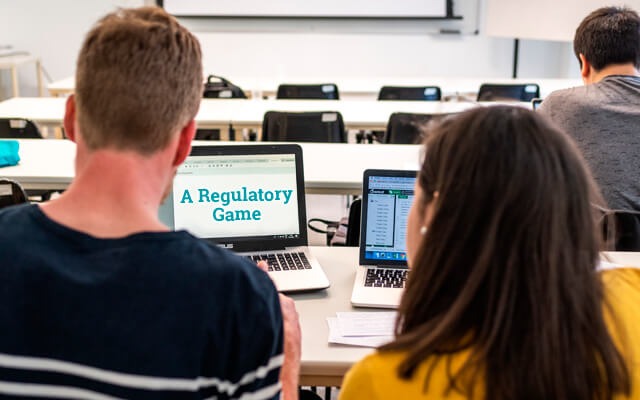study
A Regulatory Game: Competition students address market regulation cases

As part of the Master’s program in Competition and Market Regulation at the BSE, students examine competition policy and market regulation cases and review how they relate to real-world examples.
During this Winter Term, one of the courses that students are currently taking is in Quantitative Methods of Market Regulation. The objective of this course is to introduce students to the quantitative techniques that are currently employed by regulatory agencies with the aim of helping students to feel comfortable using these techniques.
About the Regulatory Game
To help the students understand how regulation works in practice, a mock situation is established. The students have to imagine that a new country has recently been formed in Europe. The focus of the exercise is placed on the gas industry that was privatized 10 years ago in this fictitious country and the price controls of the industry are being reviewed for the next five years. The regulator has put out a provisional recommendation suggesting an immediate price reduction of 16% and after that an annual reduction of 6%. The regulatory timetable laid down in the Energy Liberalisation Act means that the regulator must put forward its final recommendations. The case of the regulatory office, together with the opinions of the company and the consumer watchdog, will be put before the appeals tribunal.
To tackle this exercise, the students are divided up into four groups and each one has a different role to play:
Team A is a gas company that is concerned with maximizing its value.
Team B is the regulatory office, concerned with ensuring that the gas is supplied and transported efficiently.
Team C represents the consumer interest
Team D is the staff at the Regulatory Appeals Tribunal.
Each team is then asked to prepare and submit a single report, clearly stating and justifying the main assumptions for their final pricing recommendations.
The professor of this course, Albert Banal-Estañol, commented that “this exercise helps students to develop their skills in the tariff-setting process in regulatory environments by giving them the opportunity to practice and use the building blocks approach as well as the benchmarking techniques developed in the course".
About the Professor
Albert Banal-Estañol is Associate Professor at the Universitat Pompeu Fabra, program director of the MSc in Corporate Finance and Banking at the UPF-Barcelona School of Management, affiliated Reader at City University London, visiting professor at the IFP-Energies Nouvelles in Paris and research fellow at the SP-SP Public-Private Sector Research Center at the IESE Business School.
Banal-Estañol has provided consultant advice to merging companies and competition authorities (e.g. Office of Fair Trading). He has also delivered executive training courses for government agencies (e.g. UKs Department of Trade and Industry), regulators (e.g. Ofgem) and private companies (e.g. Gaz de France). He has also collaborated in the development of master and training programs in several African countries.
See also
> Master’s program in Competition and Market Regulation
